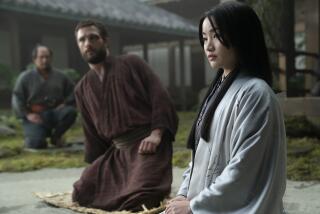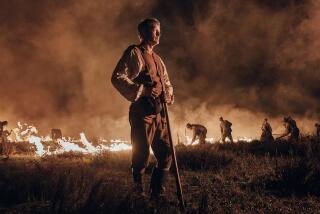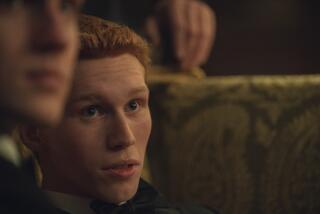‘The Hollow Crown: The Wars of the Roses’ is bloody, muddy, loud and grand
Shakespeare is the guy, your one-stop author for every sort of person and condition and situation — everything you need to comprehend the strange, messy richness of human life is encompassed within his collected works. Four centuries on, we’re still stealing from and staging him.
Three years after the BBC filmed the four Elizabethan docudramas known as “The Henriad” — “Richard II,” “Henry IV” (parts 1 and 2) and “Henry V” — as “The Hollow Crown,” it picks up the history with “The Hollow Crown: The Wars of the Roses,” which premieres in the U.S. on Sunday on PBS. It recounts the history of the houses of Lancaster and York as they vie for control of England across much of the 15th century, and if you’re a viewer whose conception of warring houses comes mostly from “Game of Thrones,” these films seem to have been made, in part, with you in mind.
The earlier “Hollow Crown” assigned its four plays to three different directors and came in a variety of styles. The new series settles for one, Dominic Cooke, with the text adapted by Cooke and Ben Power (who co-wrote the screenplay for the earlier “Richard II”). They’ve compressed four plays into three, combining the less-staged “Henry VI” plays, parts 1 through 3, with the popular “Richard III.” Indeed, such combinations seem historically to have been the rule, “Part 1” having rarely been staged on its own.
The text has been cut and rearranged; characters have been conflated, the odd line of dialogue reassigned, the boundaries between the original plays erased. (Indeed, the cycle begins with lines from another Shakespeare play entirely, “Troilus and Cressida.”) The whole Jack Cade’s Rebellion subplot has been excised, taking with it the line, “The first thing we do, let’s kill all the lawyers.” (I thought it best to prepare you.) Their aim, said Cooke, was to examine “how many bad decisions does it take to put a psychopath in power, and anything that didn’t relate to that we got rid of.”
Cooke has had a long, lauded career in the British theater. This is his first work for the screen, and as a filmmaker he can reach for some obvious effects, cross-cutting between scenes of murder and sex; going to slow-motion and Go Pro in the battle scenes.
But he does a good job of supporting the story, working in an economical epic style — shooting in fields and forests and big medieval spaces, but with the crowds and pageantry dialed down — that keeps the action human and underscores the idea that this stretch of history boiled down to a family feud.
The mood is drear, the images often dark; the music is dark too, leaning on brass and low strings. The battle scenes, of which there are several across the series’ several hours — or as Shakespeare puts it, [“They fight”] — are loud, muddy and bloody, and there’s blood between the battles as well.
The “Henry VI” plays are early Shakespeare, eventful but psychologically simple compared to what would come, and some effort has been expended to make them play less like a pageant and more like lifelike, psychologized drama. Even Richard, though a thoroughly original and memorable character with ample room for interpretation, is not particularly complicated: “I am determined to prove a villain,” he says, and does.
But even when the dialogue is merely expository, there is poetry in it. Heroes and villains, the strong and the weak — the heightened language and the mighty weight of iambic pentameter dignify the greatest character and the least. Everybody makes their case.
And when, toward the end of the second installment, Richard begins to address the audience directly, sharing the dark intentions he hides from other characters, it’s as if everything that had come before was just a vehicle to arrive at the moment. As Richard, Benedict Cumberbatch seems built for the role in looks and bearing — a little aristocratic, a little disquieting. It’s a more extravagant performance than one might have expected from him, but also an intimate one. He’s at his best when Richard is happiest, hacking away in battle, or plotting, dissembling and spreading rumors — “fake news” we call that now — as he works his way up.
As the weak and religious Henry VI, Tom Sturridge comes into his own as he loses his crown, wandering the fields in his underwear, unkempt and unshaven. Hugh Bonneville, Lord Crawley of “Downton Abbey,” is the heroic center of the “Henry VI” plays as the regent Duke of Gloucester; as Henry’s Queen Margaret, a kind of run-through for Lady Macbeth, Sophie Okonedo is the other locus of power, the negative pole. The rest of the cast — with Michael Gambon and Judi Dench the most notable names — is excellent, familiar and too numerous to enumerate.
Indeed, given this load of characters, and how many will switch sides (and sometimes back again) in the course of the story, and how quickly it moves along, it can feel a little dizzying — here one scene, gone the next. At the same time, it speaks to the impermanence of things, and of kings, which you may find a useful, even comforting, thought long about now.
‘Great Performances: The Hollow Crown: Henry VI’
Where: KOCE
When: 9 p.m. Sunday
Rating: TV-14-V (may be unsuitable for children under the age of 14 with an advisory for violence)
Follow Robert Lloyd on Twitter @LATimesTVLloyd
More to Read
The complete guide to home viewing
Get Screen Gab for everything about the TV shows and streaming movies everyone’s talking about.
You may occasionally receive promotional content from the Los Angeles Times.







